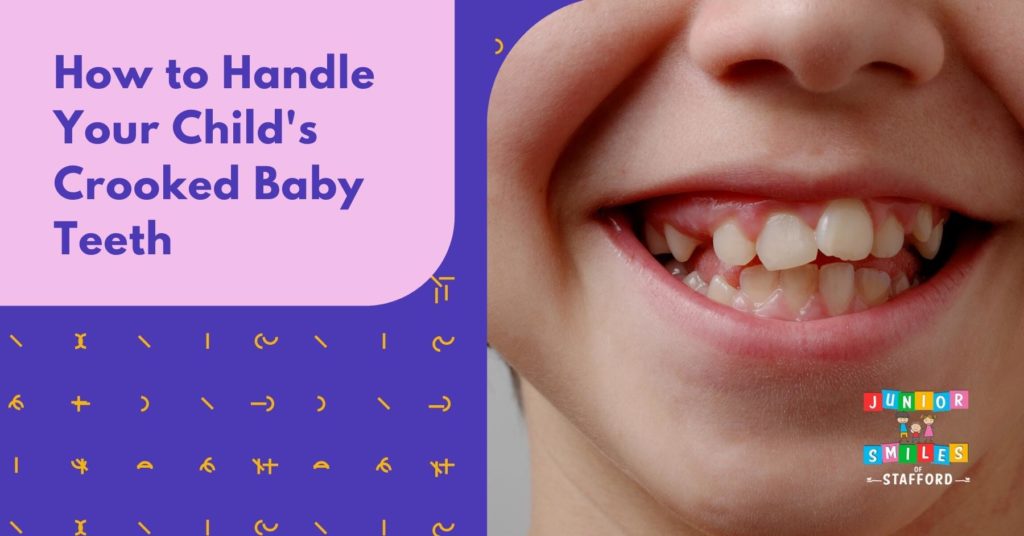Are Your Child’s Baby Teeth Coming in Crooked? Here’s What to Do

When it comes to parenting, even the smallest details can be a source of worry, and crooked baby teeth are no exception. However, it’s essential to understand that crooked teeth in infants are generally not a cause for alarm. These early teeth often emerge misaligned due to their premature appearance and the absence of adjacent teeth to guide them into place.
This blog post aims to demystify the phenomenon of crooked baby teeth, examining everything from genetic influences to the impact of prolonged baby habits like thumb sucking. We’ll provide insightful guidance on monitoring your child’s dental progression, maintaining good oral hygiene, and when to seek a pediatric dentist’s expertise.
Additionally, we’ll explore effective early intervention strategies to manage or even prevent dental misalignments. So, if you’re concerned about your child’s crooked teeth, join us as we offer reassurance and practical advice to ensure your child’s dental health is on the right track.
Are Crooked Baby Teeth a Problem?
Crooked infant teeth are usually nothing to be concerned about. In particular, this is true of the lower incisors. The bottom teeth get all the jawbone room as they erupt earliest. Lower incisors typically erupt misaligned due to a lack of surrounding teeth to correct their alignment.
Don’t panic, though because the placement of the initial milk teeth does not always correspond to the placement of the permanent teeth. Everyone knows that children change and grow at a rapid pace; this is particularly true in the early years of childhood, between the ages of three and six, when the mouth and jaw undergo significant growth. If all goes well, the teeth will naturally shift into place as more baby teeth erupt.
Why Baby Teeth Come In Crooked: Exploring Causes
Let’s explore the various factors that can contribute to the misalignment of baby teeth. Below are some examples:
Genetics
Curvature of the teeth might have its roots in the family’s genes. Chances are high that your child may be born with crooked teeth if either you or your spouse had them when you were younger. From a developmental perspective, a child’s genes can make them more likely to have crooked teeth, or they might cause problems with their jaw size, such as crowding or misalignment, which in turn causes crowding and misaligned teeth.
Prolonged Baby Habits
Babies’ teeth might shift out of place if bad oral habits like thumb sucking or using pacifiers persist for too long. Baby teeth can come in crooked, such as with an underbite or protruding front teeth, if these practices impose pressure on the growing jaw. You should strive to wean your infant off these habits when their teeth come in.
Tongue Thrusting
An incorrect swallowing technique known as “tongue thrusting” occurs when the tongue pulls down on the palate too firmly. Your kid may develop a misaligned bite or even an “open bite”—a condition in which the front teeth do not touch when the mouth is closed—as a result of this, as well as the forward movement of their baby teeth.
Tooth Decay
The purpose of infant teeth is to facilitate the correct development of adult teeth. The growth of adult teeth is affected if any of these baby teeth are disturbed or lost due to dental decay. In addition, gum disease, which can cause teeth to loosen and move, can develop from not practicing good dental hygiene on a daily basis.
What to Do When Your Baby’s Teeth Come In Crooked
When your baby’s teeth come in crooked, it can be a source of concern for many parents. Here are some tips to address and manage this situation:
Monitor the Development
Baby teeth can sometimes appear crooked initially but straighten out as they grow. Regularly check their teeth and monitor its development. You should also understand that the baby’s jaw will grow over time, potentially providing more room for teeth to align properly.
Maintain Good Oral Hygiene
Even before teeth appear, you should make it a habit to clean your baby’s gums with a soft, damp cloth. Once teeth emerge, use a small, soft-bristled toothbrush. Also use this opportunity to teach them about good oral hygiene.
Discourage Harmful Baby Habits
Baby habits like thumbsucking and using pacifiers can affect the alignment of their teeth. Try to gently wean your baby off these habits. Limit the use of pacifiers beyond a certain age, as they can also contribute to misaligned teeth.
Consult a Pediatric Dentist
Have your child’s teeth checked by a pediatric dentist early, typically around their first birthday. A dentist can provide specific guidance and intervene early if necessary. Their expertise will help you on how to manage your child’s teeth more effectively.
Be Patient and Stay Positive
Remember that tooth development is a natural process and varies for each child. Maintain a positive attitude and avoid expressing concern in front of your child to prevent them from becoming self-conscious about their teeth.
Early Intervention Strategies
Your only option, if your child’s crooked teeth are a result of heredity, is to closely monitor their development. Fortunately, further types of crooked teeth can be avoided. You should limit your baby’s thumb-sucking or pacifier-sucking habits as soon as possible. Pacifiers should not be used when a baby reaches the 12-month mark. You should stop their thumb sucking before their permanent teeth come in. Additionally, you should brush your child’s teeth as soon as they come in. Put a tiny bit of toothpaste on a baby toothbrush and try not to fret if you can’t get all of the teeth. Instilling the habit of everyday brushing in your infant is crucial at this period. Furthermore, watch out for a balanced diet for your child. Sugary and starchy foods and drinks can cause tooth decay, therefore it’s best to consume them in moderation. Give children dessert just as a small portion of a bigger meal.
When to See a Dentist
Before your kid becomes seven or eight years old, we suggest having them evaluated by an orthodontic specialist. By doing so, your child’s orthodontist can track the development of their permanent and deciduous teeth as well as the growth of their upper and lower jaws. When that happens, any space-saving or space-maintenance measures, as well as any concerns for jaw development, can happen at the most advantageous period. Meeting with your orthodontist on a regular basis might also help you anticipate their financial and insurance requirements.
Crooked Baby Teeth FAQs
Should I worry about crooked baby teeth?
No. A little bit of crookedness as newborn teeth erupt is actually fairly typical. A baby’s milk teeth serve as guides for its adult teeth as they emerge and grow into their permanent homes. The presence or absence of perfectly straight milk teeth in a child does not preclude this development from proceeding correctly.
Do kids’ crooked teeth straighten out?
Babies’ crooked teeth are quite natural and usually straighten up as they grow. The jaw and teeth of your child are still maturing, therefore it will take some time for the teeth to erupt into their proper spaces. Don’t worry too much and see your pediatric dentist if you have any concerns.
What age should you fix crooked teeth?
There is no clear-cut answer when it comes to age. However, many orthodontists suggest that it is beneficial to bring your child for their initial orthodontic visit when they are around 7 years old or as soon as any orthodontic issues arise.
Give Your Child’s Smile the Best Start with Junior Smiles of Stafford
While crooked baby teeth can be a source of concern for parents, they are often a natural part of a child’s dental development. It’s important to monitor their growth and maintain good oral hygiene practices. If concerns persist, consulting a pediatric dentist is a wise decision. Remember, each child’s dental journey is unique, and with the right care and attention, most issues resolve themselves over time. Embracing this phase with knowledge and patience can ensure your child’s smile remains healthy and bright.
As parents, ensuring your child’s dental health is paramount. If you have concerns about your child’s teeth or want to start their dental journey on the right foot, Junior Smiles of Stafford is here to help. As Stafford, VA’s leading pediatric dental clinic, we specialize in providing gentle, comprehensive dental care tailored for young smiles. Our team of experienced pediatric dentists is dedicated to creating a positive, welcoming environment for your child, making dental visits enjoyable and stress-free.

